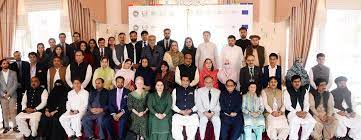Pakistani SDGs secretariat to take inspiration from China’s experiences: Convenor

Islamabad: Romina Khurshid Alam, the Convener of the Sustainable Development Goals (SDGs) National Task Force and Special Assistant to the Prime Minister, emphasized on Friday afternoon that the commitment to achieving the SDGs would be fulfilled under all circumstances.
The SDGs secretariat would take inspiration from China’s experiences to tackle various challenges faced by Pakistan, particularly in poverty alleviation, economic development, and climate change.
Speaking at the launch of the ‘Understanding China Fellowship Programme’ held in collaboration with Pir Mehr Ali Shah Arid Agriculture University, Alam highlighted the government’s efforts to strengthen Pakistan-China ties. The current parliament is focusing on boosting industrial development in the country, which is closely linked to the China-Pakistan Corridor.
Alam mentioned that confidence-building measures were being taken, leading to the renewed emphasis on building a China-Pakistan community of shared destiny.
Zahid Latif, Chairman of the Asian Institute of Eco-civilization Research and Development (AIERD), welcomed the audience and the chief guest.
He expressed AIERD’s commitment to strengthening bilateral relations between China and Pakistan through academic programs like the ‘Understanding China Fellowship,’ specifically designed for the youth and students in higher learning institutions.
Dr Azam Khan, a professor at Arid University, provided an overview of the program, explaining that participants would receive education and training on the Chinese model of growth and development, as well as the concept of shared democracy promoted by the current Chinese leadership.
The Chief Executive Officer of AIERD, Shakeel Ahmed Ramay, emphasized the importance of fostering brotherhood and friendship between the next generations of China and Pakistan.
He regarded the program as the initial step in achieving fruitful and sustainable relationships between the two countries. Pakistani youth participating in the program would gain insights into China’s economic development, agricultural technology, industry, trade, infrastructure, and more, starting from the Green Revolution in 1949. The program aimed to acquaint participants with Chinese success stories and explore how Pakistan could benefit from them.
Ramay expressed gratitude to the Embassy of the People’s Republic of China in Islamabad, Chinese Media Group, and Pakistani media for their support in making the ceremony a success.





